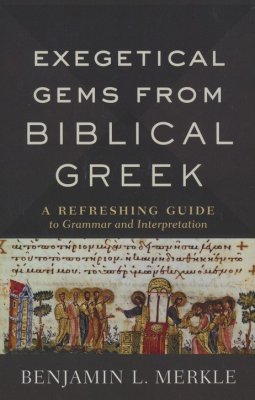Exegetical Gems from Biblical Greek: A Refreshing Guide to Grammar and Interpretation

A Denver Journal Review Article by Denver Seminary Professor David L. Mathewson, PhD.
Merkle, Benjamin L. Exegetical Gems from Biblical Greek: A Refreshing Guide to Grammar and Interpretation. Grand Rapids: Baker Academic, 2019. $19.99, Paperback. vii-171 pp. ISBN: 9780801098772
With the decreasing popularity of the biblical languages in our theological curriculum, it is more important than ever to be able to demonstrate their practical payoff for students and Christian ministers. This book by Benjamin Merkle aims to do just that – it provides a collection of practical insights from the various features of the Greek language in order to inspire ongoing usage of Greek for students and teachers. The part of the title that first gave me pause was “Exegetical Gems.” Often this sort of approach to showing the value of knowing Greek for reading the NT consists of overinterpretations and illegitimate and sensational usages of the Greek language. However, this book is nothing of the kind. Merkel defines “exegetical gems” as “substantial insights from NT passages gained by a proper knowledge and use of Greek” (vii). Hence, Merkle avoids the sensational interpretive claims of works that advocate an ‘exegetical nuggets’ approach to NT Greek. The arrangement of his book follows the arrangement of the Greek grammar that he co-authored with Andreas J. Köstenberger and Robert L Plummer, (Going Deeper with New Testament Greek: An Intermediate Study of the Grammar and Syntax of the New Testament [Nashville: Broadman & Holman, 2016]) with each chapter of his Exegetical Gems offering an exegetical insight corresponding with each chapter of their grammar in order, though one does not need to have read the grammar to appreciate this book. Merkle writes for college and seminary students, former students of Greek who need to “brush up” on the language, and teachers and professors who need to motivate their students to see the value of Greek. Each chapter consists of the introduction of a NT passage that illustrates the exegetical or grammatical issue or feature being discussed, an overview of the grammatical or exegetical issue involved, and a conclusion on how the insight gained from the overview can offer a solution to the issue found in the illustrating passage. The overview, then, will aid students in reviewing Greek grammar and the process of exegesis, before demonstrating their value for interpreting a New Testament passage.
There are many helpful insights in this work. The chapter (2) on Textual Criticism helpfully illustrates how the process works on the perennially difficult textual issue in Rom 5:1: Do we already have peace with God, or are we exhorted to have peace with God? (a matter of the ancient manuscripts containing two different moods of the Greek verb “have”). Merkle opts for the former (“we have peace with God”), though a really good case can be made for the latter (“let us have peace with God”). Two chapters illustrate how the Granville Sharp Rule and Colwell’s Rule, both regarding the article, should be understood and can be used. The chapter (31) on Context rightly helps us avoid a common misinterpretation of Phil 4:13, and the chapter (33) on Exegetical Fallacies cautions against reading fine distinctions into the contrast between the two words for “love” (agapaÅ and phileÅ) in the exchange between Jesus and Peter in John 21:15-17. All the chapters are very clearly written and come to balanced conclusions. However, a number of issues could be noted. At times, the discussion goes well beyond Greek grammar to become a discussion of theology (chapter 7 on the Accusative Case). The discussion of Eph 5:18 under the Dative Case is more about the Greek preposition en than the dative case. His treatment of the Present Tense (13) in 1 John 3:6 is too restrictive of the options for interpreting it, and relies too much on a “continuous” notion of the present tense form. His treatment of the Adverbial Participle in Matt 28:19 (22) is too dependent on English translation rather than on the grammar of adverbial participles. In the chapter (23) on Periphrastic Participles, Merkle does not tell us why he chooses the translation “will have been loosed” over other translations for Matt 18:18, except to avoid the implication that heaven ratifies what was already decided on earth. The chapter on Infinitives (24) has little to do with grammar, and the chapters on Discourse Analysis (34) and Diagramming (35) are probably too brief to cover those complex topics.
Overall, teachers and Greek students will find in this book very helpful examples of how Greek can be used to shed interpretive light on the NT text, without succumbing to extreme and sensational conclusions. In an environment where the biblical languages are deemed less and less important in our Christian colleges and seminaries, and in our churches, this book is a welcome achievement.
David L. Mathewson, PhD
Associate Professor of New Testament
Denver Seminary
October 2019
